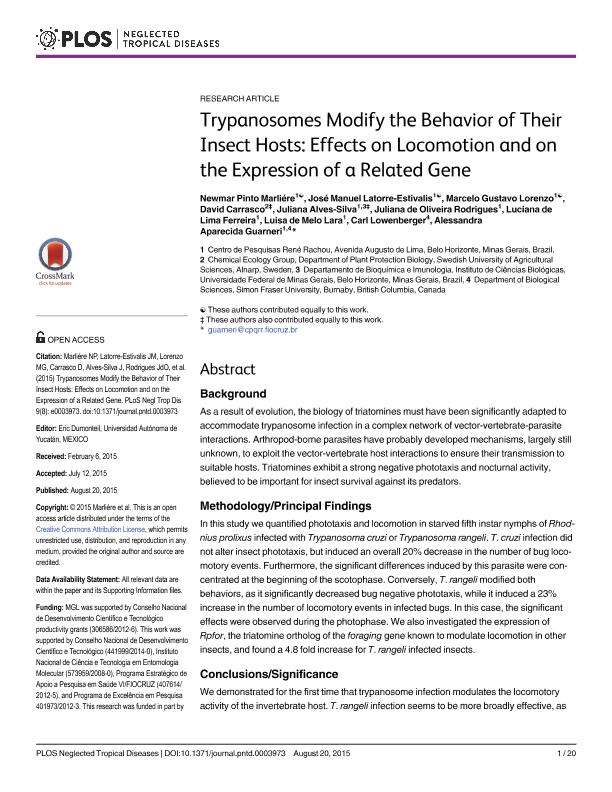Artículo
Trypanosomes modify the behavior of their insect hosts: effects on locomotion and on the expression of a related gene
Marliére, Newmar Pinto; Latorre Estivalis, Jose Manuel ; Lorenzo, Marcelo Gustavo
; Lorenzo, Marcelo Gustavo ; Carrasco, David; Alves Silva, Juliana; Rodrigues, Juliana de Oliveira; Ferreira, Luciana de Lima; Lara, Luisa de Melo; Lowenberger, Carl; Guarneri, Alessandra Aparecida
; Carrasco, David; Alves Silva, Juliana; Rodrigues, Juliana de Oliveira; Ferreira, Luciana de Lima; Lara, Luisa de Melo; Lowenberger, Carl; Guarneri, Alessandra Aparecida
 ; Lorenzo, Marcelo Gustavo
; Lorenzo, Marcelo Gustavo ; Carrasco, David; Alves Silva, Juliana; Rodrigues, Juliana de Oliveira; Ferreira, Luciana de Lima; Lara, Luisa de Melo; Lowenberger, Carl; Guarneri, Alessandra Aparecida
; Carrasco, David; Alves Silva, Juliana; Rodrigues, Juliana de Oliveira; Ferreira, Luciana de Lima; Lara, Luisa de Melo; Lowenberger, Carl; Guarneri, Alessandra Aparecida
Fecha de publicación:
08/2015
Editorial:
Public Library of Science
Revista:
Neglected Tropical Diseases
e-ISSN:
1935-2735
Idioma:
Inglés
Tipo de recurso:
Artículo publicado
Clasificación temática:
Resumen
Background: As a result of evolution, the biology of triatomines must have been significantly adapted to accommodate trypanosome infection in a complex network of vector-vertebrate-parasite interactions. Arthropod-borne parasites have probably developed mechanisms, largely still unknown, to exploit the vector-vertebrate host interactions to ensure their transmission to suitable hosts. Triatomines exhibit a strong negative phototaxis and nocturnal activity, believed to be important for insect survival against its predators. Methodology/Principal Findings: In this study we quantified phototaxis and locomotion in starved fifth instar nymphs of Rhodnius prolixus infected with Trypanosoma cruzi or Trypanosoma rangeli. T. cruzi infection did not alter insect phototaxis, but induced an overall 20% decrease in the number of bug locomotory events. Furthermore, the significant differences induced by this parasite were concentrated at the beginning of the scotophase. Conversely, T. rangeli modified both behaviors, as it significantly decreased bug negative phototaxis, while it induced a 23% increase in the number of locomotory events in infected bugs. In this case, the significant effects were observed during the photophase. We also investigated the expression of Rpfor, the triatomine ortholog of the foraging gene known to modulate locomotion in other insects, and found a 4.8 fold increase for T. rangeli infected insects. Conclusions/Significance: We demonstrated for the first time that trypanosome infection modulates the locomotory activity of the invertebrate host. T. rangeli infection seems to be more broadly effective, as besides affecting the intensity of locomotion this parasite also diminished negative phototaxis and the expression of a behavior-associated gene in the triatomine vector.
Palabras clave:
Triatomines
,
Parasites
,
Behaviour
,
Foraging
Archivos asociados
Licencia
Identificadores
Colecciones
Articulos(CCT - LA PLATA)
Articulos de CTRO.CIENTIFICO TECNOL.CONICET - LA PLATA
Articulos de CTRO.CIENTIFICO TECNOL.CONICET - LA PLATA
Citación
Marliére, Newmar Pinto; Latorre Estivalis, Jose Manuel; Lorenzo, Marcelo Gustavo; Carrasco, David; Alves Silva, Juliana; et al.; Trypanosomes modify the behavior of their insect hosts: effects on locomotion and on the expression of a related gene; Public Library of Science; Neglected Tropical Diseases; 9; 8; 8-2015; 1-20; e0003973
Compartir
Altmétricas



